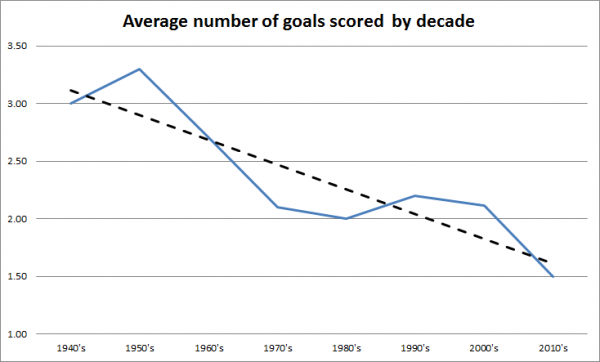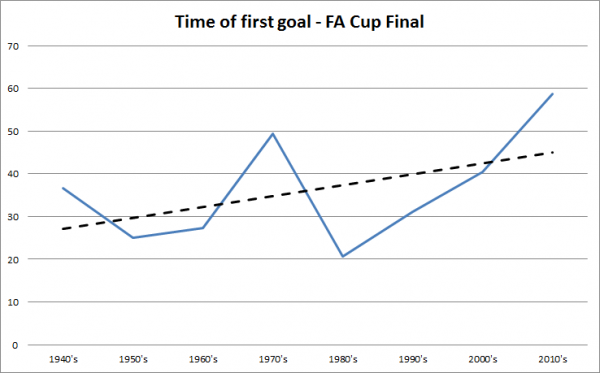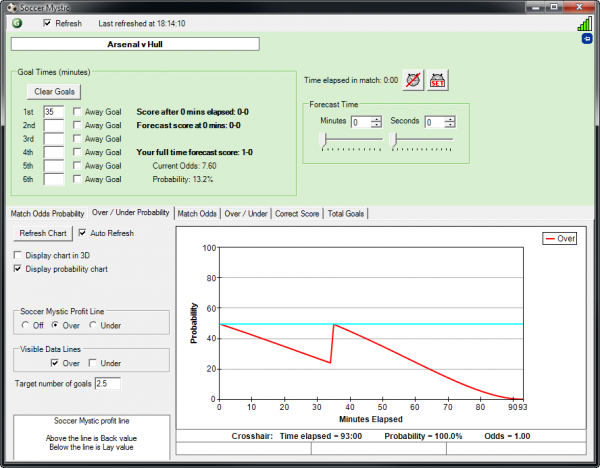So the FA Cup final is upon us and, rather predictably, the final has delivered us two premiership teams. But what will the match deliver? Is that going to be as predictable as well?
How many goals in the FA Cup?
I’ve delved back over a number of years to see if I can unlock some prevailing trends.
History has shown us, the FA Cup is no particular respecter of individual team strength. Both teams know they are only 90 minutes from glory, so tactics for both teams is geared to the hope that they can get a result. This means that for both teams the overriding fear is not making a mistake. As such, the finals can often be tense, low-scoring matches.
It’s getting tighter as well. I looked at all FA Cup finals and the match results in normal time since the Second World War. Matches with two goals or less account for 58.2% of all finals, extend that to three or less and that figure rises to 73%. The most revealing detail, however, is when you plot the average number of goals by era. The trend since the 1940’s is for fewer and fewer goals to be scored.
When you cut the data to look at the difference between teams it has hovered constantly around the average of one goal between the teams at full-time. So the final has been consistently very competitive for each decade since the 1940’s. Of course, statistics can create a ‘flaw of averages’, a big win can be brought back to earth by a stalemate the following year. But competitive tight matches generally appear to be the norm in the FA Cup. Even if you take what looks on the surface as an uncompetitive fixture, they still tend to produce low scoring, tight matches; and that’s getting more and more common. So given that the game is likely to be Spartan on the goal scoring front, when will the first goal arrive?
When does the first goal arrive?
Another graph paints a revealing picture for the time of the first goal. On average, when a goal has been scored, it is scored in the 34 minute. But again, the trend is moving away from an earlier goal. This is quite logical as fewer goals in the match tend to mean they will arrive later.
The interesting thing about this occurs when you compare it to when the second goal is likely to be scored. This has remained pretty static over the same period. This suggests that teams generally play the FA Cup Final in a defensive mode with a view to putting not conceding a goal as key. But if a goal is scored then the gloves are off!
Ultimately all this makes perfect sense and you may have figured that the final may be played this manner. But you can now put some numbers on it and get confirmation from my spreadsheet! Bear in mind you should always use statistics carefully, not like a drunk uses a lamppost; for support rather than illumination.
Deeper insight using Bet Angel
If you are looking for a much deeper insight into the match then you should look no further than Bet Angel. Bet Angel contains a specialist tool, Soccer Mystic, that allows you to experiment with all the possible scenarios that could occur in the match and project them forward to see how they will impact your bet, trade or cash out value. It’s a really powerful tool, designed specifically for football markets and it’s free with Bet Angel. Using the over / under tool you can predict what time the market is predicting that first goal will arrive. If you think that’s too long back unders, too short, back over. It really is that simple.




When will you get up to date? The “premiership”? Do you not mean two premier league teams? Scotland has the premiership, or were you writing about Celtic v Motherwell?
With a title of FA Cup, I suspect I may have been talking about the English cup.